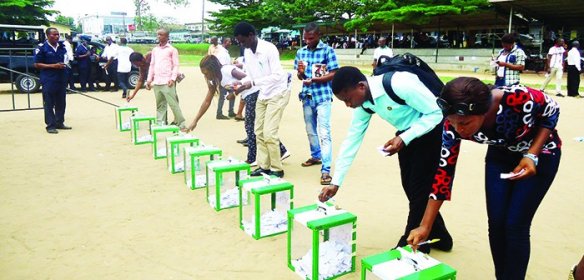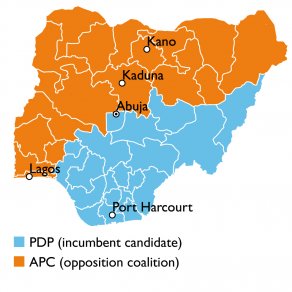On 14 February, the population of Nigeria, Africa’s largest democracy, were supposed to go to the polls to elect a new president. This election might have proven a watershed in Nigerian history. For the first time, the opposition had a realistic opportunity to take over from the Peoples Democratic Party (PDP), which has held power ever since free elections were re-introduced in 1999. The security problems in the north-east of the country have made the Independent Electoral Commission (INEC) postpone the election until 28 March. This may prove an effective barrier for the opposition, and increase the risk of an explosion of violence both before and during the election.

Student elections in Calabar, Nigeria.
A strengthened opposition
The opposition party All Progressives Congress (APC) is an alliance that was established in 2013. Its presidential candidate, Muhammadu Buhari, is becoming ever more popular, while support is waning for the incumbent president, Goodluck Jonathan. Never before has the opposition managed to mobilize a united front in order to make a bid for power, and never before has it had a greater chance of success. The development of a genuine opposition is a healthy sign in a country that has previously functioned as a one-party state under the PDP. Three factors have been particularly important for the increasing popularity of Buhari, namely the voters’ sense of identity, Boko Haram and oil prices.

Likely majority votes in the 2015 Nigerian presidential election.
Ethnic, religious and geographical affiliation and representation are extremely important factors in Nigerian politics. For this reason, there has been much strategic political positioning in the run-up to the election. Traditionally, the presidential chair has alternated between the north and the south of the country, and Jonathan (from the south) has challenged this “rule” merely by running for re-election. Voters in the northern states now consider it to be their turn to hold the office, since “their” president, Umaru Yar’Adua, died in 2010 and was succeeded by Goodluck Jonathan. Meanwhile people in the south-west of the country feel ignored by the political elite, since no one from states in this region has held a significant political office under Jonathan. Accordingly the APC is attempting to secure votes from these regions by putting forward a presidential candidate from the north-west and a vice-presidential candidate from the south-west. Additionally – in a move to damp down accusations that Buhari has an Islamic agenda, which is feared by Nigeria’s large Christian minority – the APC’s vice-presidential candidate is a Christian. Jonathan and the PDP have support from states in the south and centre of the country, but these states have fewer voters, leading Buhari to believe he should in principle be able to gain a majority. In a move to prevent this, Jonathan has given several important ministerial posts to representatives from northern states.
Voters’ sense of identity is not the only factor that will be decisive for the election. The growing threat from the terrorist group Boko Haram is leading more and more people to question Jonathan’s ability to win Nigeria’s “war on terror”. The terrorists have not been stopped, the 200 kidnapped schoolgirls have not been saved, and the army lacks discipline and loyalty. All this gives the impression of a government that has neither the power nor the capacity to crack down on the rebels.
A third factor is Nigeria’s economic development. Under Jonathan’s leadership, Nigeria’s oil-driven economy has grown to become the largest in Africa: agriculture has been revitalised, infrastructure has improved, and the building and transport sectors have experienced upturns. The Nigerian currency, the naira, has been stable and investment from abroad has increased. But now, the falling oil price has reversed this positive trend at the worst possible time for the incumbent president. During the last three months the economy has declined and public-sector salaries have remained unpaid. What previously appeared to be Jonathan’s strongest card now appears to be boosting the opposition.
Postponement
Nigeria was ready for a very exciting and important election 14 February. Just one week before the scheduled date, the election was postponed due to the security risk in the Boko Haram-controlled north-eastern regions. In the light of the recent increase in Boko Haram’s use of violent tactics, there is a very high risk of attacks on polling stations by suicide bombers. 1.5 million people are internally displaced in these regions, and it seemed virtually impossible to organize an election that would make it possible for these voters to participate. In addition, members of the Electoral Commission (INEC) have feared for their own personal safety, and refused to travel into these areas. This has added to INECs problems in distributing polling cards. Nigeria is Africa’s most populous country and has over 60 million registered voters. Many of these voters have not yet received polling cards, especially in the turbulent areas in the north-east.
Still, many voters are very disappointed about the postponement of the election, and there have already been protests and demonstrations. Many question whether a 6-week postponement of the election could possibly make a difference, given that the government has not managed to stop Boko Haram in the last 6 years. The postponement also increases the risk of the opposition making allegations of fraud, which in turn would be likely to trigger outbreaks of violence.
The postponement does not favour the opposition, since it might give Jonathan the opportunity to regain the advantage. Opposition politicians have claimed that the sitting government would attempt to influence INEC to postpone the election, thereby securing victory for Jonathan at a later date. Some have gone as far as accusing the PDP of intentional inertia in fighting the terrorists, simply to achieve this postponement. Until now, the opposition has grown stronger day by day, but with oil prices on the rise, and the current government making strengthened efforts in the fight against Boko Haram, the direction of the pendulum may shift enough to close the opposition’s window of opportunity.
For a more detailed account, see the Policy Brief from the PRIO Conflict Trends Project, Nigeria’s Presidential Election 2015
This text was published in Norwegian at NRK Ytring, 14 February 2015: Mulighetenes vindu lukker seg i Nigeria